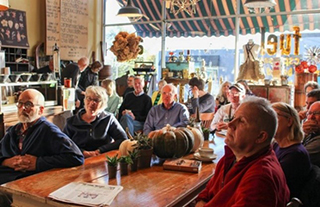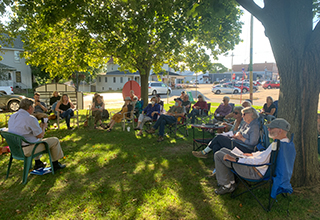February 24, 2023

(Photo courtesy of Jackie Curnick)
For more than a decade, scientists from the NIEHS-funded Environmental Health Sciences Core Center (Core Center) at the University of Iowa (UI) have met with community members at a local coffee shop or public library to discuss various scientific topics. The lively discussions got UI Core Center members Brandi Janssen, Ph.D., and Jackie Curnick, M.D.P., wondering: Once the coffee is drained and guests head home, do they share what they learned with others? They found that information gleaned during these gatherings trickles out to the broader community via social networks.
Called Science Cafés, the casual get-togethers serve to connect the public with science and researchers. Since the first Science Café took place in 1997 at a wine bar in England, organizers have been measuring participant interest and satisfaction. But Janssen and Curnick took their evaluation a step further by exploring how people shared what they learned at a local Science Café later with friends and family. Understanding this transfer of information is especially important in rural communities, like those served by the UI Core Center.
“In small communities it can be difficult to draw a high number of participants at community outreach events, so assessing how information travels beyond an individual event is key for evaluating overall impact,” said Janssen, director of the UI Core Center’s Community Engagement Core. “Plus, in small close-knit communities, social networks are an important source of information.”
Taking Science to the People
The UI Core Center hosts Science Cafés in the agricultural communities of Fairfield and Mount Vernon, Iowa. Residents gather in a public space to hear researchers talk about a scientific topic of interest to the community.
“We want this to be a dialogue, not a lecture, so we limit researchers to a 20-minute presentation without slides. Then we turn it over to the audience for questions and further discussion,” said Curnick, who organizes and oversees the hour-long events.

UI Core Center member Jerald Schnoor, Ph.D., left, talked at a September 2021 Science Café. To ensure safe gatherings during the COVID-19 pandemic, the events were held outside and virtually.
(Photo courtesy of Jackie Curnick)
Presenters are often UI Core Center scientists who discuss their research on water and air quality, agriculture, pesticides, cancer and the environment, and more. Community members also recommend topics for future gatherings, with agriculture-related issues often taking top billing – reflecting the area’s robust farming economy.
“The Science Cafés are mutually beneficial. Participants learn about science relevant to their health and their communities while researchers learn how to talk about their work in a non-scientific setting,” said Curnick, program coordinator for the UI Center’s Community Engagement Core.
Social Science
Following a series of Science Café events in 2019, Janssen and Curnick interviewed 18 participants about how they shared information with their social networks. The most common way was through casual conversation with family and friends. Some used social media and created videos and posters to further distribute messages.
Several participants shared their knowledge in a professional setting. For example, farmers, water quality testers, and college students who attended a Science Café reported later discussing relevant topics with their colleagues and classmates. Social groups and community organizations were another avenue for circulating information. Participants raised Science Café topics at book clubs, breakfast clubs, and local Sierra Club chapter meetings.
“Participants reported using the information to provide additional weight or legitimacy when talking about an environmental health topic. They emphasized the fact that this was credible research they could use to bolster their perspectives,” said Janssen.
Moving forward, Janssen and Curnick will formally analyze the discussions that take place during Science Café events to identify ways to improve the series for attendees and the broader community.
“Working with these communities is so rewarding, and I’m grateful to our dedicated group of Science Café attendees,” said Curnick. "This program means a lot to them, and I feel lucky to be a part of that.”


